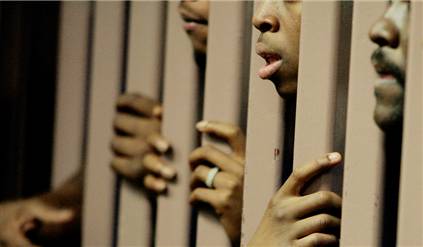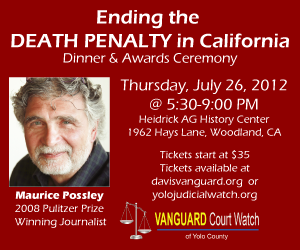 In 2010, the Yolo County District Attorney’s office, led by Deputy DA Clinton Parish, sought to put Robert Ferguson, charged with the theft of a package of shredded cheese, into prison for life under California’s three strikes law.
In 2010, the Yolo County District Attorney’s office, led by Deputy DA Clinton Parish, sought to put Robert Ferguson, charged with the theft of a package of shredded cheese, into prison for life under California’s three strikes law.
Eventually Judge Warriner agreed to strike one of the strikes, but that still left Mr. Ferguson with a seven-year prison sentence for stealing $3.99 worth of shredded cheese.
Under a new ballot initiative, this type of offense would not qualify under the California Three Strikes Law.
On Monday, California Secretary of State Debra Bowen certified the revision of the three strikes law as the state’s seventh ballot measure for the November ballot, and an eighth measure was subsequently added.
In order to qualify for the ballot, the three strikes initiative needed 504,760 valid petition signatures, which is equal to five percent of the total votes cast for governor in the November 2010 gubernatorial election.
According to the Attorney General’s official title and summary, the law “revises three strikes law to impose life sentence only when new felony conviction is serious or violent. Authorizes re-sentencing for offenders currently serving life sentences if third strike conviction was not serious or violent and judge determines sentence does not pose unreasonable risk to public safety.”
It would continue to impose the current life sentence “if third strike conviction was for certain non-serious, non-violent sex or drug offenses or involved firearm possession.”
It also maintains a life sentence if any of the prior convictions were for rape, murder or child molestation.
According to the Legislative Analyst’s Office, “State savings related to prison and parole operations that potentially range in the high tens of millions of dollars annually in the short run, possibly exceeding $100 million annually in the long run.”
They added, “Increased state and county costs in the millions to low tens of millions of dollars annually in the first few years, likely declining substantially in future years, for state court activities and county jail, community supervision, and court-related activities.”
The measure has the support of both San Francisco’s and LA’s District Attorneys.
San Francisco District Attorney George Gascón has called the measure “conservative,” arguing it will save the state billions of dollars without turning soft on crime.
“I have been in law enforcement for over thirty years and I know that spending more money on prisons doesn’t solve the bigger issue of reducing crime. The Three Strikes Reform Act saves California taxpayers money and restores the original intent of the law by focusing on truly dangerous criminals,” Mr. Gascón said.
“This is not about soft-on-crime,” the district attorney said. “The hardcore violent offenders will continue to be dealt with very harshly according to three strikes.”
He argued that the reforms make both moral and financial sense, with over 40% of current third strike inmates in California in prison for non-violent and non-serious offenses, to the tune of $100 million in annual costs to taxpayers with medical costs for them over their lifetimes costing $4.7 billion.
“If you look at the traditional law-and-order community, they feel that this is somehow a slippery slope,” Mr. Gascón said. “This by itself is a very conservative, very thoughtful, very tightly crafted reform to three strikes and one that is sensible from a law enforcement point of view and a financial point of view.”
He is joined by one of his colleagues, Los Angeles DA and former Republican candidate for Attorney General, Wes Cooley.
Mr. Cooley said, “The state should not allow the misallocation of limited penal resources by having life prison sentences for those who do not pose a serious criminal threat to society. The punishment should fit the crime.”
The measure is written by Stanford Law School professors, and is modeled after Senate Bill 1642, which was drafted by Los Angeles District Attorney Cooley in 2006, and the Three Strikes sentencing policy that District Attorney Cooley successfully implemented in Los Angeles County almost twelve years ago.
“The Three Strikes Reform Act is right for California,” said District Attorney Cooley. “It will ensure that the punishment fits the crime. Dangerous recidivist criminals will remain behind bars for life, and our overflowing prisons will not be clogged with inmates who pose no risk to public safety.”
Meanwhile, the measure has gotten a boost from fiscal conservatives. The OC Watchdog (of the Orange County Register) came out in favor of it.
They argued it would save the state tens of millions a year in the short run and more than $100 million per year in the long run.
They write, “Voters came this close to revamping Three Strikes back in 2004, when a ballot initiative mandating that the third strike be a violent or serious crime was overwhelmingly ahead in the polls just 10 days before the election. Enter then-Gov. Arnold Schwarzenegger’s commercials against the change – commercials bankrolled by O.C. billionaire bad boy Henry T. Nicholas III to the tune of $3.5 million – and the turnaround was dramatic. The measure failed.”
However, times have changed. The economy was better in 2004 and they argue, “The cost of Three Strikes wasn’t as galvanizing an issue as it may turn out to be this year.”
They argue, “A scathing report by the California State Auditor in 2009 found that the number of prisoners in the California Department of Corrections decreased by about 1 percent over three years; but its expenses increased by 32 percent over that time period anyway. It painted a disturbing portrait of a department reeling under the weight of spiking salaries, high overtime payouts, generous retirement benefits and a mandatory Three Strikes policy that its employee union fervently backed – and which had swelled California’s prisons to their breaking point.”
In fact, they add, “One out of every four prisoners in the system were third strikers, the auditor found. The cost of keeping them in jail for these longer sentences: $19.2 billion.”
However much fiscal conservatives are getting behind this measure, even Grover Norquist is supporting the reform.
He said, “The Three Strikes Reform Act is tough on crime without being tough on taxpayers. It will put a stop to needlessly wasting hundreds of millions in taxpayers’ hard-earned money, while protecting people from violent crime.”
—David M. Greenwald reporting

I am so happy to hear that the “Three Strike Reform” is going to the ballot. It makes so much sense to make the punishment fit the crime, and it saves money too.
It has been disheartening to see third strikes given in this county for non-violent, minor crimes. I am glad to see such strong supporters like the San Francisco and Los Angeles DA’s.
Maybe that will help the public see that you can be tough on crime and still be reasonable when setting the charges and sentences.
I’m glad they are finally reforming 3-strikes. Unfortunately, the reform is superficial. The 3rd strike as “sold” to the voters was for serious felonies, such as rape and murder.
As stated above, “It would continue to impose the current life sentence “if third strike conviction was for certain non-serious, non-violent sex or drug offenses or involved firearm possession.””
The spirit of the law as originally intended in this country is that once someone has “paid their debt” to society they get a new start. Debt paid! Unfortunately, we as a society forgot that and want to keep punishing people over and over again.
Non-serious offences should be handled in a non-severe way. If we all walked a mile in someone’s shoes who has dealt with the legal system, we might all think differently. Try reading some of the biographies or anthologies of people who were innocent and survived the nightmarish legal system. It might just change your mind.
Glad reform is happening, but we still have a long way to go.
From text above:
According to the Attorney General’s official title and summary, the law “revises three strikes law to impose life sentence only when new felony conviction is serious or violent. Authorizes re-sentencing for offenders currently serving life sentences if third strike conviction was not serious or violent and judge determines sentence does not pose unreasonable risk to public safety.”
This sounds very reasonable!
Good news, I’ll likely vote for it; and encourage others to as well.
David,
Surprised you’re not getting more comments about this, considering what a big deal 3 strikes has been in California.
I think this is a major piece of good news–from my prior posts you may remember I’m a hardliner on violent crime; such as gangs which can degrade or destroy quality of life and intimidate or terrorize an entire neighborhood; but I’m more moderate on nonviolent crimes.
I hope the measure gets voted in this fall; I suspect that it will.